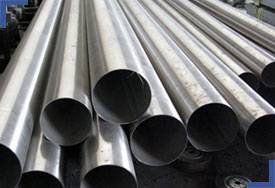Stainless steel 304 pipes are a ubiquitous sight in many industries, silently performing vital roles in various applications. From residential plumbing to industrial processing, these pipes offer a blend of durability, corrosion resistance, and versatility that make them indispensable. Let’s delve into the characteristics and applications of stainless steel 304 pipes, shedding light on why they are a preferred choice across diverse sectors.
Understanding Stainless Steel 304
Stainless steel 304, often referred to as 18-8 stainless, is a popular grade known for its excellent corrosion resistance, formability, and weldability. Comprising 18% chromium and 8% nickel, along with small amounts of carbon and manganese, this austenitic stainless steel offers robust mechanical properties alongside its corrosion-resistant nature.
Corrosion Resistance: A Key Advantage
One of the primary reasons for the widespread use of stainless steel 304 pipes is their exceptional resistance to corrosion. Whether exposed to moisture, chemicals, or varying temperatures, these pipes maintain their integrity over time, minimizing the risk of leaks, contamination, or structural degradation. This property makes them ideal for applications in corrosive environments, such as chemical processing plants, marine installations, and wastewater treatment facilities.
Durability and Longevity
Durability is another hallmark of stainless steel 304 pipes. Engineered to withstand harsh operating conditions, these pipes exhibit high tensile strength and impact resistance, ensuring long-term performance without compromising structural integrity. Their longevity translates to reduced maintenance requirements and lower lifecycle costs, making them a cost-effective solution for both residential and industrial projects.
Versatility Across Industries
The versatility of stainless steel 304 pipes is perhaps their most compelling feature. From conveying fluids and gases to supporting structural frameworks, these pipes find application in a myriad of industries:
- Construction: In construction projects, stainless steel 304 pipes are favored for their strength, corrosion resistance, and aesthetic appeal. They are commonly used in plumbing systems, HVAC installations, and structural components where reliability and longevity are paramount.
- Food and Beverage: The hygienic properties of stainless steel 304 make it an ideal choice for food and beverage processing. Whether transporting potable water, dairy products, or acidic liquids, these pipes ensure product integrity while complying with stringent sanitation standards.
- Chemical Processing: Stainless steel 304 pipes play a crucial role in chemical processing industries, where resistance to corrosion from acids, alkalis, and other corrosive substances is essential. They are employed in the transport of chemicals, acids, and solvents, safeguarding both the integrity of the conveyed materials and the surrounding environment.
- Oil and Gas: In the oil and gas sector, stainless steel 304 pipes are used in pipelines, refineries, and offshore platforms due to their resilience in corrosive and high-pressure environments. They facilitate the safe transport of hydrocarbons while withstanding exposure to saline environments and extreme temperatures.
Conclusion
Stainless steel 304 pipes epitomize reliability, durability, and versatility, making them indispensable across a spectrum of industries. Whether it’s ensuring the safe transport of fluids, maintaining sanitary conditions in food processing, or withstanding the rigors of chemical exposure, these pipes excel in diverse applications. As technology advances and industries evolve, stainless steel 304 pipes continue to be a cornerstone of modern engineering, embodying the timeless combination of strength and resilience.

